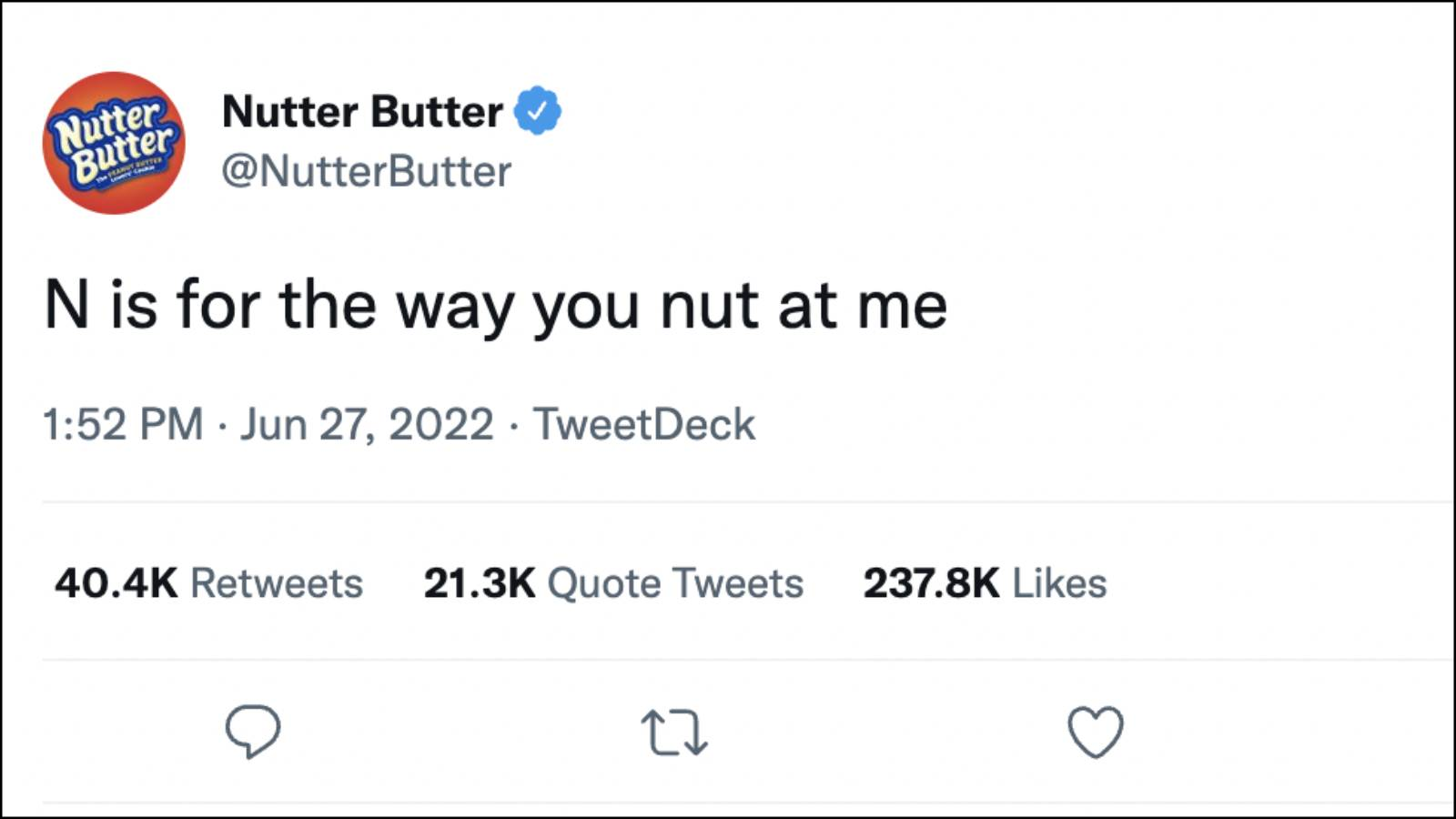Nutter Butter Is Horny On Twitter, But So Are All These Other Brands
Nutter Butter has us wondering: are NSFW tweets a good marketing strategy?
Twitter is the horniest of all social media platforms. While the acceptance of being horny on main is a blessing for those of us who refuse to let the threat of unemployment censor our social media feeds, things get a little dicier when major food and beverage brands try to get in on the fun. Most recently, Nutter Butter has caused some users to clutch their pearls by tweeting this:
N is for the way you nut at me
— nutter butter (@NutterButter) June 27, 2022
"N is for the way you nut at me," reads the tweet, presumably a play on the lyrics to "L-O-V-E" by Nat King Cole.
Five years ago, this is the kind of tweet that could signal a social media manager is about to be fired. But now it's just one in a sea of lusty 280-character-or-less messages being fired off by major brands under that little blue bird logo. Still, that doesn't mean there are zero consequences—not all of those tweets remain on the timeline, and even the ones that do can cause damage to a brand's reputation, whether because it isolates more conservative customers or is simply is too cringe for the cool kids to take seriously.
When did brands start being horny on main?
While there may be outliers here and there, the exact moment that brands started to really let loose and not get reprimanded for it can be traced back to a single tweet from Netflix. On December 5, 2019, Netflix tweeted: "what's something you can say during sex but also when you manage a brand twitter account?"
what's something you can say during sex but also when you manage a brand twitter account?
— Netflix (@netflix) December 5, 2019
Official, verified food and drink brands filled the replies, and many of the tweets have not yet been deleted:
- Arby's: "Do you want more meat?"
- Jimmy John's: "That was freaky fast!"
- Natural Light: "These are all natural."
- Wingstop: "Bone-in please."
- Rolling Rock: "We're rock hard."
- Kettle Brand Chips: "You can go elbow deep in me."
Each tweet has thousands (sometimes hundreds of thousands) of interactions, thereby asserting brands' relevance in the booming Twitter meme space. And it opened a floodgate for social media managers, who were now evidently allowed to do whatever the hell they wanted.
When being horny on main backfires
Whoever runs (or ran, RIP) the Pabst Blue Ribbon account discovered earlier this year exactly where the line of acceptable horniness is when they crossed it. In a since deleted tweet from January 3, 2022, seemingly to mark the start of the Dry January season, PBR wrote: "Not drinking this January? Try eating ass!"
According to Ad Age, PBR ended up apologizing for a "rogue employee" with "bad judgment" who sent out the message. Meanwhile on my personal Twitter feed, I saw people calling whoever sent this tweet a hero and an icon (full disclosure: my Twitter feed is full of horny ne'er do wells, so this may not be an accurate sampling of how society as a whole felt about it).
The brand suffers two blows in this instance, first from the audience who would initially complain about the message and cause it to be taken down in the first place, and secondly from the legions of deviants who are then angry with PBR for being too square to just let the tweet live on. It's a delicate line to walk, and sometimes you can't win either way, even if you're an alcohol brand that doesn't exactly portray itself as SFW.
When being horny on main works best for brands
There's no such thing as bad press. If a brand goes viral for an NSFW tweet, then at least people are talking about them, right? In the case of Wingstop, a string of sexual-innuendo-laden flirty messages from May 2021 ignited a conversation about whether the person sending the tweets deserved to be fired or promoted. Those messages, along with several people tweeting that the posts specifically caused them to order Wingstop that day, are still up—so we're guessing Wingstop went the "promoted" route.
In April of this year, Snickers used some innuendo of its own to not only attract viral attention, but dispel a rumor going around the internet that the "dick vein" was removed from its candy bars. Off-putting to some, maybe, but this proved to be successful because it was responding to something that was already being discussed. Tapping into internet culture and understanding how to interact with it instead of just cringe-ingly appropriating a meme in the incorrect way is how brands can continue to successfully exist on social media.
Internet trends are always changing, so Twitter might not be horny forever. But while it still is, we'll keep scrolling, ready to retweet and share every NSFW post that comes across our timeline from our favorite food and drink brands.
